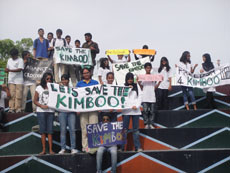Former Secretary General of Maldives Association of Tourism Industry (MATI) ‘Sim’ Mohamed Ibrahim stepped down from his position in December 2012, having held the post for the last 15 years. Prior to his work at MATI, Sim held various positions within the tourism industry, even working at Television Maldives as the Chief of News and Current Affairs.
Luke Powell: The Tourism Ministry has put a lot of emphasis on achieving one million tourist arrivals for 2013, how important is this target and is this the right way to go about measuring success in the industry?
Sim Mohamed Ibrahim: There are many ways of measuring tourism. The most important of those measures is in terms of yield, as in what you have left after your expenses. I think there is a big challenge at the moment in this area. Despite resorts being very full, there are a few companies relying on Chinese tourists, and while tourists from China are good in the sense of keeping numbers up, in terms of yield, it’s not good.
It’s very expensive to run the resorts and I think we are not doing as well as we should be. Last year was not so good, we were able to keep the numbers fairly high but they were again mostly Chinese. It’s not really about the numbers, what we should have is average occupancy at good rates, however, we are finding that difficult to maintain as we now have to bring down the rates, offer discounts, and give special prices, to make up for the numbers being down.
The one million tourists mark is always good in terms of marketing and public relations as it is a nice big number. It keeps the momentum up and is very good psychology. But it’s not such a huge thing now.
LP: In your time at MATI, what developments did you oversee and were there ever any difficulties in carrying out your role?
SMI: My time was purely administrative. Our main concern at the time was trying to get the best deal for people who invested in the tourism industry and worked in the industry.
My main role was to try and keep people together and to push for common goals. We worked with the government and parliament, which was not easy. We found out that in parliament you have people from different parties and people with different viewpoints and motivations. It turned out that working with parliament was always difficult, whereas with the government it was easy.
With [former President Mohamed] Nasheed it was a lot easier to work, as he was someone very well known and familiar to us. He had his moments, he would sometimes stick to something and not let go, but usually we found we could negotiate and he in turn would talk to his cabinet and to his group we would be able to come to compromise.
LP: You said that working with parliament was not always so easy, what difficulties were there?
SMI: Some issues we couldn’t really agree on, some people wanted to ban alcohol from the country, but tourists drink it like water. It’s like us with coffee and tea. So how do you work with people like that? It becomes impossible.
Even with the economic issues, there are people who have the perspective that the people in the Tourism Ministry make too much money and that the government should be taking more from them.
They don’t really understand the workings of the ministry, running costs, investments costs and the facilitation of all these things. It’s like a normal business, but there is an idea in the country that the tourism ministry is rolling in the stuff. There are bills to pay, loans to pay and staff to pay, it’s very hard running tourism in this country.
LP: Would you say that attitude still exists? Earlier this year there was criticism from MATI over the decision to allocate just MVR 20 million from the 2013 budget for tourism promotion, when the tourism ministry had requested MVR 200 million.
SMI: There are people within parliament who think the tourism ministry is so rich they can fund their own advertising and promotion. It has been said, I can’t quote, but there are some who say that. But obviously it’s not true, people in the ministry are already financing quite a bit of it.
LP: Are there other difficulties faced by the tourism industry in the Maldives?
SMI: It is hard here because there is a lot of work and there is so much co-ordination. Everything has to be brought in, cleared by customs, taken to the resorts and then prepared.
The other difficulty is the management of human resources. A lot of young people in the country do not want to work in the tourism industry so you have this sole problem of finding Maldivians who want to work as opposed to people from overseas who want these jobs.
That doesn’t sit very well with the local population because the media is obviously employed by people who are not very happy with the tourism industry for using expatriates. All the money is going outside the country, when it should be going to Maldives.
Maldivians are not working in this industry because they are not given entitlements and privileges and because they think the industry is not paying all that much, but this is not true. It is just that the kind of work we have in the resorts has not yet become attractive to young Maldivians leaving school.
LP: What sort of work is available to them? Is there any other reason why they are not taking the jobs?
SMI: A resort in the Maldives is like a small town, so you have technical, engineering, maintenance, food production and public relations roles. They all exist on the island.
There is always this thing between the government, the public and the Tourism Ministry, whereby the government and the people seem to assume that the tourism ministry should be training its own people.
It’s difficult because many of us feel the education system in country should be geared towards teaching people to serve the economy and the country, and that should be through jobs available in the Maldives. For example, we checked the Ministry of Tourism once and there were perhaps a thousand jobs going.
What I am saying, is that the jobs are there, but we haven’t been able to tell the young people that there is an alternative in resorts where they can work. But there is something missing, it is not gelling.
Working in tourism is not part of the school curriculum. They teach travel and tourism, but that is not to do with running hotels and hospitality. They are linked, but they are not the same thing. These are some of the problems the industry faces in the country.
LP: How do you think the tourism industry as a whole in the Maldives is progressing?
SMI: I think the industry is going very well here. People who started this 40 years ago are still very involved and these guys have so much experience because they have worked every single day of their lives and know what’s going on and what’s needed.
People like Champa, his company has comes up with brilliant new concepts every time. Then there is Universal, they have a very high standard and a lot of their resorts are home-grown, places like Baros and Kurumba, these are local companies but they are able to compete with world standard brands. There is a lot of thinking going into that. People are not just sitting back and taking the money, they are planning where to go next.
LP: There have been some negative reports in local media regarding resort developments by Maldives Tourism Development Company (MTDC), what is your view on the firm?
SMI: MTDC was a very good project to start with, it was very good thinking because not everyone can be an entrepreneur or even a manager. There are people who just don’t have the skills or inclination to do that. MTDC was a brilliant idea where we can all have shares in the tourism industry.
The former chairman of MTDC ‘Champa’ Hussain Afeef, when he took on something, he would complete it. Herethera Resort for example is the same distance as Sri Lanka is from us in Male’, 470 miles, yet he built that resort in just over a year. That was amazing.
However, when Nasheed came in, he obviously wanted to bring in new management, he knew these people but he misjudged the importance of somebody like Afeef there. When Nasheed removed him, the company made losses and it became worthless. It was such a brilliant thing, shattered. Nasheed has put people in there, the president has put people in there and these people have not been able to come up with any creative ideas.
If they bring in good management they might turn a profit, but right now it is terrible. It has to be resurrected and changed. Someone needs to be brought in who can see things strategically and has empathy for the people. See the company for what it is – a company for the people. But it is worthless at the moment, it needs to be revamped.
LP: What do you think the future holds for the tourism industry in the Maldives?
SMI: There is a trend moving towards people who are wanting to stay and see something different, rather than coming just for relaxation. People want to be involved in the community. It’s not going to be huge, but there are some people who want to do that, it’s a different kind of tourist.
The future of tourism in this country is immense. We have already started building rooms underwater. We already have clubs, dining rooms, and spas and very soon we will have entire bungalows underwater. However, the time it takes to get the Maldives and the cost of getting here is an issue for the future. If they build better planes, and find a way of reducing fuel costs that will be much better for the country, but this is not something we cannot predict.
LP: Why did you decide to leave MATI?
SMI: I needed a break, I had been there for 15 years and I needed to do something different. Being in tourism all these years I realised there is another aspect to tourism that has been totally ignored, and that is culture and environmental tourism. I thought it would be very interesting for me to start digging into this.
LP: Do you think that will be a new tourism market in the Maldives?
SMI: It will be a niche in the market. It might get a bit bigger when we start taking conservation seriously and the restoration of our historical sites – things like the old mosques and cemeteries. There is a lot of history in this country that we have not even tapped yet and that makes me very excited.
Likes (0)Dislikes
(0)Dislikes (0)
(0)  Last year, Minivan News reported that the crocodile was forced to curl its tail to fit inside its roofed cage.
Last year, Minivan News reported that the crocodile was forced to curl its tail to fit inside its roofed cage.